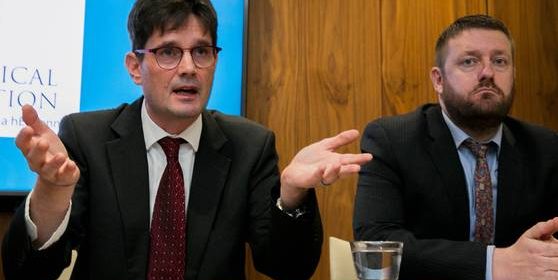Clinics and surgery face being cancelled if consultants take to picket line in new year

Hospital patients are facing the risk of major disruption, including the cancellation of clinics and surgery, in the new year if consultants and junior doctors take industrial action.
Around 3,500 specialists and trainee doctors could take to the picket line following a decision by the Irish Medical Organisation (IMO) last night to hold a ballot for industrial action, up to and including strike action.
The doctors are angry at the failure of the Government to address the pay gap, which has left consultants hired since 2012 earning around €50,000 less than colleagues employed before that date.
They said this has led to a recruitment crisis, with 500 specialist posts unfilled.
A ballot could take place in a number of weeks, with industrial action being triggered early in 2020.
Consultants have never taken industrial action, but junior doctors have curtailed services on a number of occasions over the years.
They promised patient safety would be safeguarded.
The exact form of industrial action has yet to be worked out, but it could see outpatient clinics and non-urgent surgery being cancelled.
Asked yesterday how they could defend cancelling outpatient clinics, the senior doctors said services are already being disrupted because of a shortage of doctors.
Dr Clive Kilgallen, chairman of the IMO consultant committee, said: “We could have decided to stay on our hospitals and say everything is all right. But everything is not all right and patients are not getting treated. We have to do something.”
The waiting lists to see a specialist mean that some patients are being diagnosed with illnesses later than they should be, the doctors warned.
Dr Matthew Sadlier, a Dublin psychiatrist, said hospitals cannot hire the necessary medical expertise because so many doctors are ignoring consultant jobs and not staying to work here.
“There are 770,000 patients on hospital waiting lists and another 165,000 waiting for vital imaging services such as MRI,” he said.
The Public Service Pay Commission has recognised the pay gap between longer-serving and newer-entrant consultants is a key factor in problems of recruitment and retention.
Dr Anthony O’Connor (39), who is a gastroenterologist in Tallaght Hospital, took a pay cut when he returned home in 2016 with his wife Deirdre and two children after working in Boston in the US and Leeds in the UK.
Due to his experience, he started on a higher point of the scale at around €120,000.
“It was the time of the last election and the promise was that the pay cuts would be reversed,” he said.
The Cork city native said his job is very enjoyable, but very difficult and stressful.
He gets job offers from hospitals abroad all the time, most recently from France.
The impact of the pay gap has meant that hospitals are now seeing resignations from full-time posts, he added.
“It would be a horrible day for me if I had to go on strike. Patient safety would be the most important consideration.
“There is every chance for the Government to resolve this. There is buy-in from all quarters,” he added.
A recent meeting with health officials led to no progress. Health Minister Health Simon Harris has said engagement on the issue will continue.
Source: Read Full Article